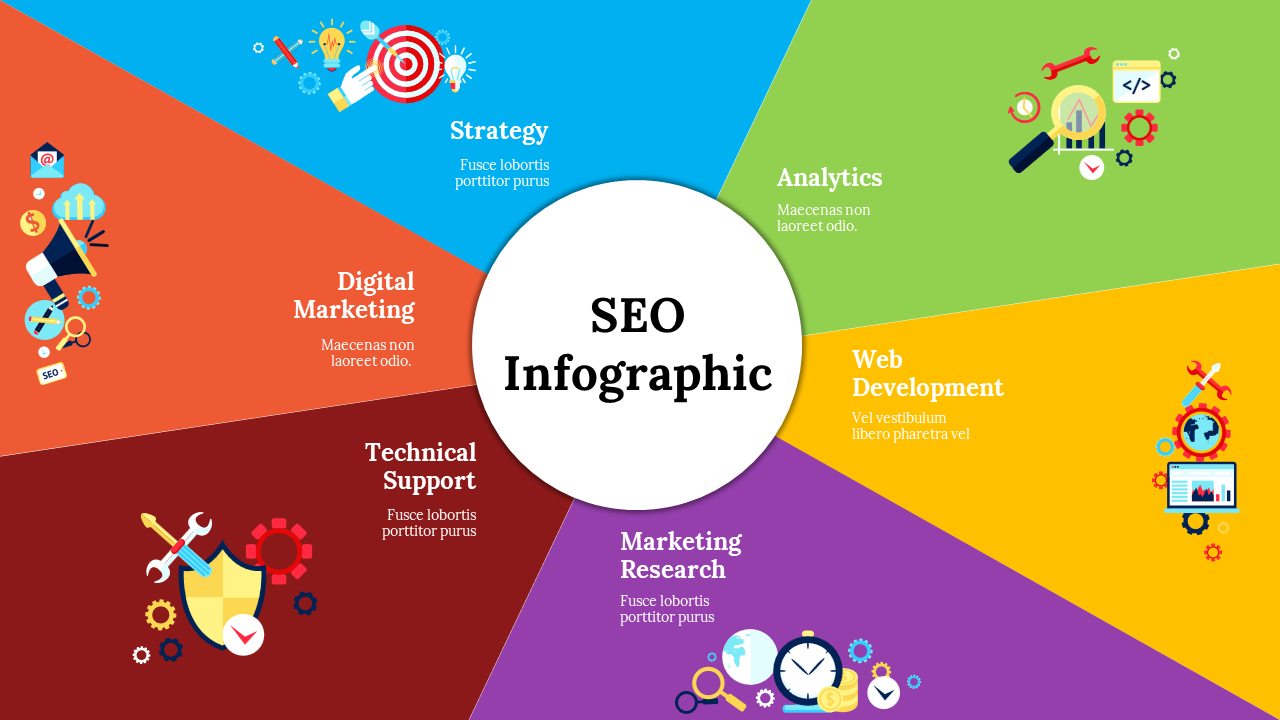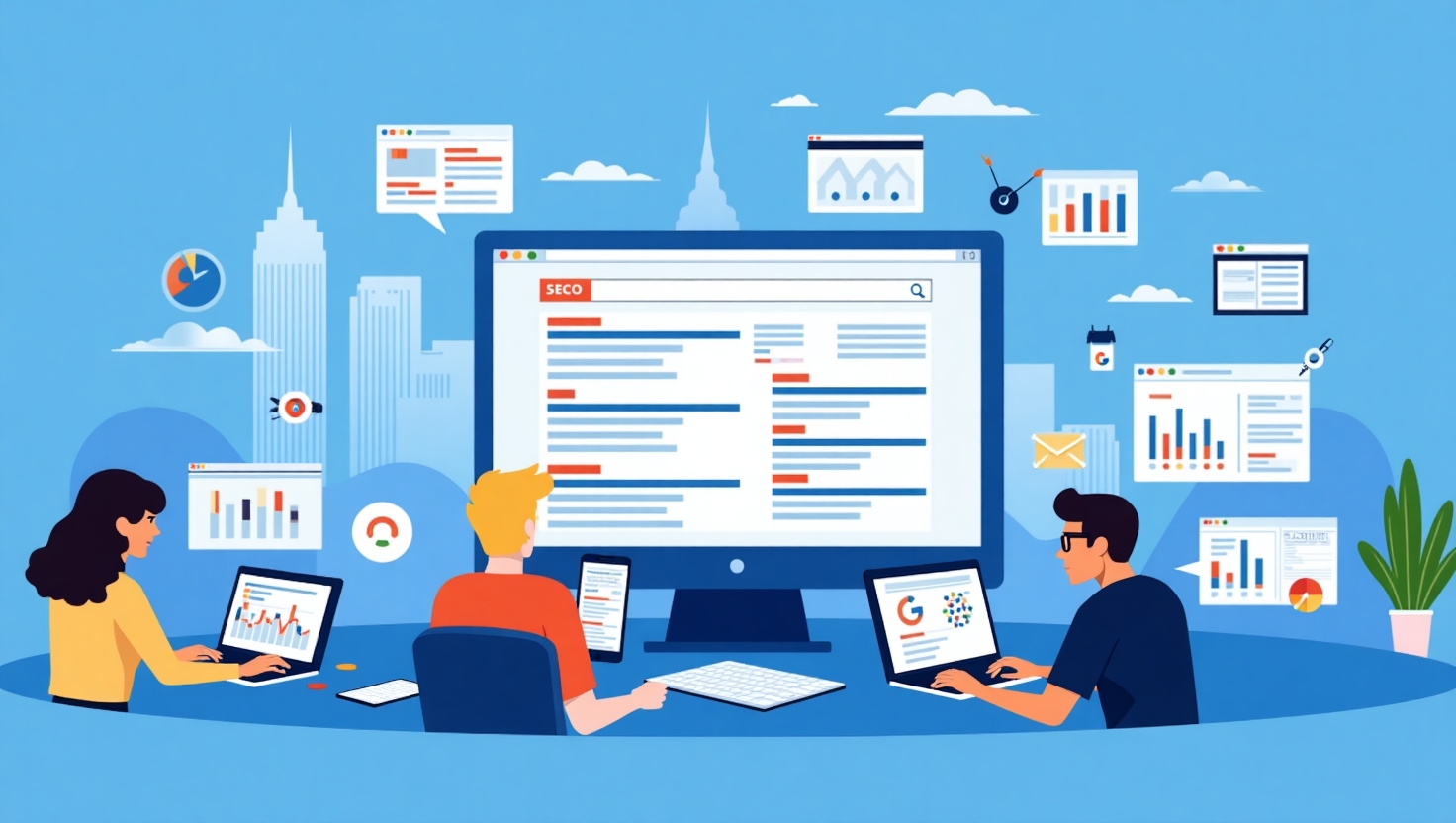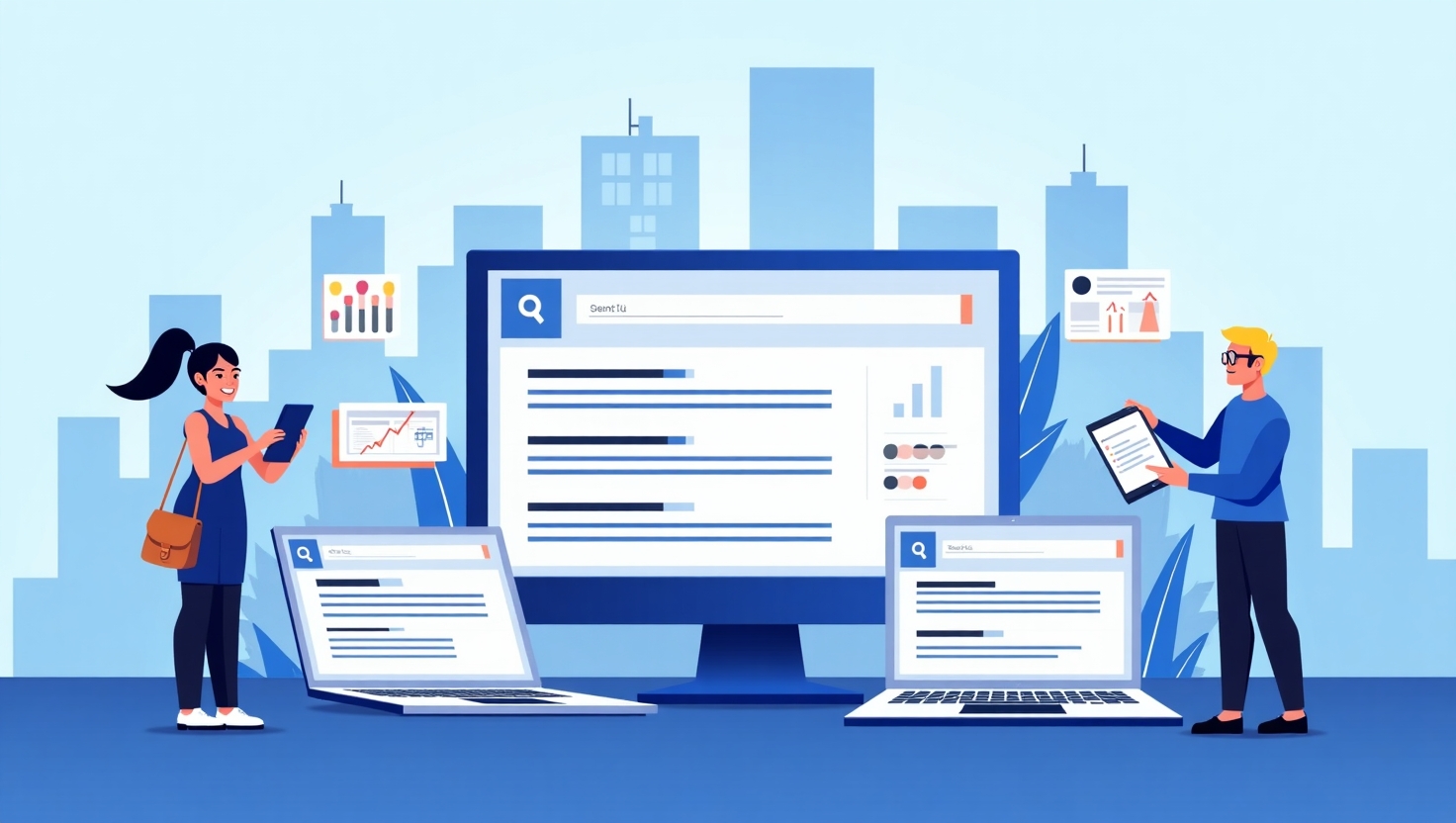Unlock explosive growth by mastering the synergy between search engine optimization and digital marketing.
Introduction: Why SEO + Digital Marketing = Unstoppable Growth
Imagine opening a luxury boutique in the middle of a desert. No roads, no signs, no foot traffic. That’s running a business without SEO and digital marketing. The digital landscape is more competitive than ever, with businesses vying for visibility across countless online channels. Yet, many organizations treat search engine optimization as an isolated technical task rather than the foundational element that powers all digital marketing efforts.
The statistics are undeniable: 53% of all website traffic comes from organic search, while businesses integrating SEO with digital marketing see 20% higher ROI than those treating them separately. This isn’t coincidence—it’s the result of strategic alignment between content visibility and audience engagement. Throughout this comprehensive guide, you’ll master clear definitions of both disciplines, understand how SEO fuels every digital marketing channel, discover seven battle-tested integration strategies, and learn to measure success with industry-leading tools.
Part 1: Demystifying the Core Concepts
A. What is Digital Marketing?
Digital marketing encompasses all marketing efforts delivered through digital channels to connect with current and prospective customers. It’s a multifaceted discipline that includes search engine optimization, content marketing, social media engagement, email campaigns, pay-per-click advertising, and affiliate partnerships. Unlike traditional marketing, digital strategies allow for precise targeting, real-time analytics, and dynamic optimization based on performance data.
The digital marketing ecosystem functions as an interconnected network where each channel amplifies the others. SEO serves as the foundation, ensuring your content reaches the right audience through organic search. Content marketing builds trust and authority, social media expands reach and fosters community, email marketing nurtures leads through personalized communication, PPC delivers immediate visibility for competitive terms, and affiliate marketing leverages partnerships for extended reach. When these components work in harmony, they create a self-reinforcing cycle of growth and engagement.
B. What is SEO?
Search Engine Optimization (SEO) is the strategic practice of optimizing content to achieve higher rankings in search engine results pages (SERPs). It operates through three fundamental pillars: technical SEO ensures your website meets search engine requirements for speed, mobile compatibility, and security; on-page SEO focuses on creating high-quality content with proper keyword integration and meta elements; and off-page SEO builds authority through backlinks and brand mentions from reputable sources.
Modern SEO extends far beyond keyword stuffing—it’s about delivering exceptional user experience and authoritative content that satisfies search intent. Google’s E-E-A-T guidelines (Experience, Expertise, Authoritativeness, Trustworthiness) emphasize that valuable content created by knowledgeable creators naturally rises in rankings. Technical elements like site speed (ideally under three seconds), mobile responsiveness, and HTTPS security form the foundation, while content quality and relevance determine long-term visibility.
C. Is SEO Part of Digital Marketing?
Absolutely—and understanding this relationship is crucial for modern marketing success. SEO functions as the root system of digital marketing, providing the visibility and traffic that makes all other channels effective. Without proper search optimization, even the most compelling content, innovative social campaigns, or expensive ads remain invisible to your target audience.
This misconception stems from treating SEO as a siloed technical task rather than an integral component of every marketing initiative. When businesses delay SEO implementation or isolate it from other channels, they create artificial barriers that limit growth potential. The most successful organizations recognize that SEO insights should inform content creation, social media strategy, email campaigns, and advertising decisions—creating a unified approach where each element strengthens the others.
Part 2: The Relationship: How SEO Powers Digital Marketing (and Vice Versa)

A. SEO as the Engine of Digital Marketing
Consider the case of a SaaS company that integrated SEO principles with their content marketing strategy. By systematically optimizing blog posts for high-intent keywords and building topical authority, they achieved a 300% increase in organic leads within six months. This success story illustrates SEO’s transformative power when properly aligned with broader marketing objectives.
SEO enhances every digital channel in measurable ways. In content marketing, strategic keyword optimization ensures your articles reach target audiences actively seeking solutions. For social media, SEO-optimized posts consistently generate three times more shares than non-optimized content, expanding organic reach. Even email marketing benefits—subject lines incorporating relevant keywords increase open rates by 22%, while linking to SEO-optimized content drives sustained traffic long after the campaign ends. Pay-per-click campaigns become more efficient when informed by SEO data, identifying high-converting keywords that maximize advertising ROI.
B. How Digital Marketing Amplifies SEO
The relationship is beautifully reciprocal: digital marketing activities directly enhance SEO performance through a powerful feedback loop. When you publish SEO-optimized content that attracts organic traffic, readers naturally share it on social platforms and link to it from their own websites. These social signals and backlinks increase your domain authority, which further improves search rankings—creating a virtuous cycle of visibility and engagement.
A travel brand demonstrated this synergy perfectly by using Instagram to promote their SEO-optimized destination guides. The social exposure generated 40% more backlinks from travel bloggers and news sites, ultimately securing first-page rankings for competitive terms like “best European destinations.” This example shows how digital marketing doesn’t just support SEO—it actively accelerates it through increased brand exposure, user engagement, and authority building.
Part 3: Actionable Strategies: Integrating SEO into Your Digital Marketing Plan
A. Step 1: Keyword-Centric Content Planning
Tools: SEMrush, Ahrefs, Google Keyword Planner
Process:
Map Keywords to Buyer Journey:
STAGE |
KEYWORD EXAMPLE |
CONTENT TYPE |
| Awareness | “what is seo in online marketing” | Blog, Video |
| Consideration | “best seo tools 2024” | Comparison Guide |
| Decision | “hire seo agency” | Service Page |
- Cluster Content:
- Pillar Page: “Ultimate Guide to SEO and Digital Marketing” (this article)
- Cluster Content: “SEO for Social Media,” “Email Marketing SEO Tips”
B. Step 2: Optimize All Digital Channels for SEO
Social Media:
- Profile Optimization: Include primary keywords in bio (e.g., “Digital Marketing & SEO Expert | Helping brands rank #1”)
- Post Optimization: Place target keywords in first three lines; add descriptive alt text to images
Email Marketing:
- Subject Lines: Transform generic titles into keyword-rich phrases (e.g., “5 SEO Strategies to Boost Your Digital Marketing ROI”)
- Body Content: Naturally incorporate keywords like “online marketing seo” while linking to optimized blog posts
PPC Campaigns:
- Leverage SEO data to bid on high-intent keywords (e.g., “seo services for small business”)
- Ensure landing pages are fully optimized for speed, mobile experience, and content relevance
Step 3: Measure What Matters
KPI Dashboard:
METRIC |
SEO FOCUS |
DIGITAL MARKETING FOCUS |
TOOL |
| Organic Traffic | ✅ | ❌ | Google Analytics |
| Conversion Rate | ✅ | ✅ | Google Analytics |
| Backlink Growth | ✅ | ❌ | Ahrefs |
| ROI | ✅ | ✅ | HubSpot |
Actionable Tip: Track “SEO-assisted conversions” in Google Analytics to quantify how organic search impacts sales throughout the customer journey.
Part 4: Debunking Myths: SEO vs. Digital Marketing
Myth 1: “SEO is Dead; Social Media is All You Need”
Despite persistent claims that social media has replaced search optimization, the data tells a different story. Social platforms drive approximately 5% of website traffic, while organic search accounts for over 53%—more than ten times the volume. This doesn’t diminish social media’s value; rather, it highlights how these channels serve distinct purposes. The most effective approach uses social platforms to amplify SEO-optimized content, creating a distribution network that extends the reach of your search-optimized assets.
Myth 2: “Digital Marketing = Paid Ads Only”
While paid advertising delivers immediate visibility, it represents only one facet of digital marketing. Organic SEO generates 5.3 times more long-term ROI than paid campaigns, building sustainable visibility that continues producing results long after ad budgets are exhausted. The smartest allocation dedicates 60% of resources to SEO and content development, with 40% supporting paid initiatives—creating a balanced approach that captures both immediate and sustained growth.
Myth 3: “SEO and Digital Marketing Compete for Budget”
Rather than competing, these disciplines create efficiency when integrated. Companies implementing unified strategies reduce customer acquisition costs by 30% while improving overall campaign performance. The solution lies in restructuring teams to ensure SEO insights inform all digital initiatives, eliminating redundant efforts and maximizing resource efficiency across channels.
Part 5: Beyond Basics: Advanced Tactics for 2024

A. Voice Search Optimization
With voice assistants now handling over 20% of mobile searches, optimizing for conversational queries has become essential. This means targeting natural language phrases that mirror how people speak rather than type. Instead of focusing solely on “best seo tools,” optimize for complete questions like “what are the best seo tools for small businesses in 2024?” Implementing FAQ sections throughout your content naturally captures these long-tail queries while improving featured snippet opportunities.
B. AI-Powered SEO
Artificial intelligence is revolutionizing SEO workflows through advanced content optimization and automation. Tools like ChatGPT accelerate content ideation and creation, while platforms like SurferSEO analyze top-ranking pages to provide precise optimization recommendations. MarketMuse takes this further by evaluating content against E-E-A-T standards, ensuring your material meets Google’s quality guidelines while addressing user intent comprehensively.
C. Local SEO + Digital Marketing
For location-based businesses, integrating local SEO with broader digital marketing creates powerful community connections. Start by fully optimizing your Google Business Profile with detailed service descriptions incorporating keywords like “internet marketing seo.” Complement this with geo-targeted social campaigns—Facebook ads targeting “seo agency near me” combined with locally relevant content can significantly increase visibility within your service area.
Conclusion: Your Roadmap to Dominance
The journey through SEO and digital marketing integration reveals three fundamental truths that should guide your strategy moving forward. First, search optimization isn’t optional—it’s the essential foundation that makes all other digital marketing efforts visible and effective. Second, integration consistently outperforms isolation; when SEO informs content creation, social strategy, email campaigns, and advertising decisions, the cumulative impact far exceeds the sum of individual efforts.
Implementation should begin with manageable steps: start by optimizing your blog content and email sequences, then gradually expand to social media and paid channels. This phased approach allows you to build momentum while refining your processes. To accelerate your progress, download our free SEO + Digital Marketing Integration Checklist, which provides a step-by-step framework for alignment. For personalized guidance, join our live webinar “10X Traffic with Integrated SEO & Digital Marketing” where we’ll dive deeper into advanced tactics and answer your specific questions.
The brands that thrive in tomorrow’s digital landscape will be those that recognize SEO and digital marketing not as separate disciplines, but as interconnected components of a unified growth engine. By implementing the strategies outlined in this guide, you’re positioning your organization to capture sustainable visibility, engagement, and conversion in an increasingly competitive online environment.


